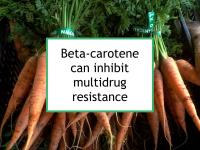Numerous studies have linked dietary beta-carotene to reduced breast cancer risk, although not all studies are in agreement. One European study reported that high intake of beta-carotene was protective against breast cancer in postmenopausal women using hormone replacement therapy (HRT).
The same study also found that dietary beta-carotene was associated with lowered risk of breast cancer in postmenopausal women with relatively high alcohol consumption. A U.S. study reported that high consumption of carotenoids may reduce the risk of premenopausal but not postmenopausal breast cancer, particularly among smokers. These results suggest that beta-carotene is able to counteract some of the carcinogenic effects of harmful diet and lifestyle choices. Now a new study has reported that beta-carotene is effective in reducing multidrug resistance in cancer cells.
Beta-carotene supplements are not recommended
Beta-carotene should be obtained through diet rather than supplements. Studies of vitamin A and beta-carotene supplements have not had favorable results, most famously in the case of lung cancer. In one well-known study, approximately 18,000 men and women who were smokers, former smokers, or workers exposed to asbestos were randomly assigned to take daily supplements of beta-carotene or vitamin A. Unexpectedly, the risk of lung cancer was found to be 16% higher among participants taking either supplement compared to those taking a placebo after a six-year follow-up period. In addition, one major 2012 study reported that frequent use of combined carotenoid supplements (including beta-carotene and other carotenoids) was associated with a two-fold increase in breast cancer-specific death among breast cancer survivors.
Latest research finds beta-carotene reduces multidrug resistance
The study referenced at the beginning of this news story was designed to investigate the influence of beta-carotene on multidrug resistance in cancer cells. Cells that have developed multidrug resistance are a major cause of chemotherapy failure. The ATP-binding cassette (ABC) efflux transporters play an important role in such failure. This family of proteins help determine the pharmacological behavior of drugs by affecting their oral bioavailability, direct intestinal effects, and urinary excretion of metabolites. In addition, the penetration of drugs into specific cell- and tissue compartments can be greatly inhibited by ABC transporters. Therefore, interactions with ABC transporters determine to a large extent the effectiveness of chemotherapy drugs, as well as their side effects.
Researchers have developed several generations of ABC transporter inhibitors. However, none of these inhibitors have been successful in producing better outcomes for patients because they have turned out to have harmful systemic toxicities and drug-drug interactions. The authors therefore decided to examine beta-carotene as a possible safer choice to defeat multidrug resistant cancer using three types of multidrug resistant cancer cells, including BCRP (breast cancer resistance protein) cells. The cytotoxicity and transporter inhibition potency of beta-carotene was evaluated using various assays, including an doxorubicin efflux assay.
Beta-carotene was found to significantly inhibit important ABC transporter functions without concurrent harmful effects. Beta-carotene also partially inhibited BCRP efflux function. In addition, beta-carotene significantly potentiated the cytotoxicity of chemotherapy drugs in multidrug resistant cancer cells. The authors conclude that beta-carotene may be considered a chemo-sensitizer and considered as an adjuvant therapy in multidrug resistant cancer treatment.
